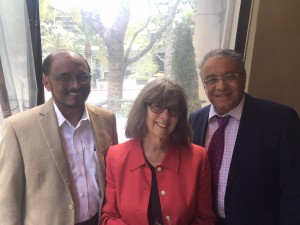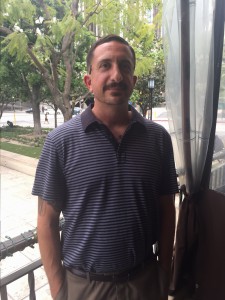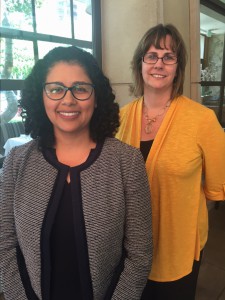On April 18th, representatives from the University of Southern California, Loyola Marymount University, California State Polytechnic University, and California State University, Los Angeles met to discuss successes and next steps for the year-old Diversity, Inclusion and Access (DIA) Initiative to create pathways for underrepresented students to enter Ph.D. programs at higher rates.
The staff in attendance were asked, “Why is the DIA Initiative important?”
As the Director of the McNair program at LMU, it is important for me that our school have like-minded partners to benefit our first generation, low income students.
– Thomas Zachariah, Ph.D., Associate Professor and Director of the McNair Scholars Program, Department of Mathematics, Loyola Marymount University
Students from low-income backgrounds often cannot pursue higher education because of other obligations, ‘If only I had help with health insurance. If only I had help with childcare. If only I didn’t have to work so much to pay the bills.’ The DIA Initiative provides access for students from Cal State LA, Cal Poly Pomona and LMU to doctoral programs at USC with tuition assistance, health benefits and stipends. This program is working to alleviate the ‘onlys’ that prevents students from continuing their studies.
– Sally Pratt, Ph.D., Vice Provost, USC Graduate Programs, The Graduate School, University of Southern California
We have so many inspiring students that I think will be great assets to USC’s doctoral programs. The DIA initiative helps to set up a direct pipeline between talented students and prestigious programs.”
– Ricardo Machón, Ph.D., Special Assistant to the Provost for Undergraduate Education, Professor of Psychology, Loyola Marymount University.
It has been important to me to help build a partnership with USC for students from Cal State LA. Our school is the largest working class university in Los Angeles with 90% of the school population being people of color and first generation. You should hear some of the stories of what my students go through to be in school. They are caring for families, dealing with the criminal justice system, working two or three jobs, but at the end of the day, they want the best education possible.
– Robert Weide, Ph.D., Assistant Professor, Department of Sociology, College of Natural and Social Sciences, California State University, Los Angeles
Cal Poly has a robust STEM program. This is a great opportunity for our STEM students in underrepresented populations to progress in their degrees. It is also becoming an important recruitment tool for us to get more students into our programs, particularly STEM, knowing that we can connect them to higher education when they have finished at Cal Poly.
– Linda Hoos, J.D., Assistant Vice President and Chief Diversity Officer, Office of Equity, Inclusion and Compliance, California State Polytechnic University, Pomona
The DIA Initiative demystifies the process of applying to doctoral programs. We’re here to benefit students.
– Cheryl Koos, Ph.D., Assistant Professor, Department of History, College of Natural & Social Sciences, California State University, Los Angeles
At the helm of the DIA Initiative for USC is newly hired, Ashley Brooks.
Ashley Brooks joins USC after serving many years as the Engagement and Inclusion Consultant for the University of Pittsburgh Medical Center. Los Angeles, as a hub of diverse cultures, backgrounds, races and ethnicities, was an enticing prospect for Brooks as she considered moving across the country. “As a first generation student and minority, I can relate to some of the challenges that traditionally underrepresented students face on college campuses,” Ashley explained about her decision to work for the DIA Initiative. “I’m excited for what lies ahead for me at USC.”




